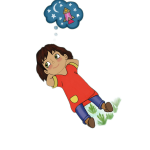Poetry gives children a healthy and creative way to access, explore and express their feelings.

It’s often difficult for children to explain what they’re feeling, even to themselves.
Pinning down a feeling and finding the words to the describe it isn’t something that comes naturally to everyone. Writing poetry gives children a way to explore their inner world and express the abstract, sometimes tangled, bundle of feelings they find there by using concrete images from the world around them.
When we encourage our children in the practice of writing poetry for pleasure, rather than only for academic purposes, we help them learn an essential life skill. A life skill that can help children to let their feelings out instead of bottling them up, communicate more effectively, and find a point of peace in a world that’s often tumultuous and unkind.
Access, explore, express
Poetry is a powerful way to:
Access and explore our inner world. Poetry frees us from thinking about what we feel and allows us to just let those feelings find expression in images and symbols.
Express the inexpressible. Since poetry relies heavily on symbolism and metaphor, we can use objects and images to express something that ordinarily could not be expressed through everyday language.
Say what we are too afraid to say. Writing as a form of personal reflection and expression means being creative in a judgement-free space, which gives use the freedom to voice thoughts and feelings that we’re too uncomfortable or afraid to express otherwise.
Safely allow someone else into your inner world. Sometimes we feel more comfortable sharing an experience, thought or feeling in writing than saying it out loud. What’s more, using metaphors and images drawn makes it easier for the person reading our work to understand it.
Restructure an experience, make sense of it, and draw meaning from it. Writing about an experience can help us process the feelings related to it, if there’s hurt it can help us acknowledge and work through that hurt.
Encourage expression but don’t demand access
Over time, poetry can become a safe space for our children. A space where they can create and recreate the world through their words. As caregivers, we can encourage them to share parts of that world with us, but it’s essential that we respect the sanctity of that space enough not to demand access. And when we are gifted with entrance, we should tread gently there.
When a few words or a whole poem are shared, we should listen without judgment and respond without criticism. There is tremendous power in poetry, and we empower children in innumerable ways when we bring it out of the classrooms and into our homes.
